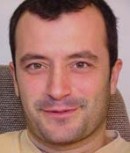
Plenary Lecture
Neurodegenerative Disease Detection: Use of Emotional Recognition or Emotional Stage

Professor Carlos M. Travieso-González
University of Las Palmas de Gran Canaria
Spain
E-mail: ctravieso@dsc.ulpgc.es
Abstract: The advances based on image processing and pattern recognition is generating the development of different sciences and modalities due to the multidisciplinary collaboration. Health and biomedicine are a good example. In particular, this work presents the use of emotional detection for the Neurodegenerative disease detection. It can be used for various purposes, as the detection of possible symptoms of neurological diseases or the evolution of neurological diseases in humans.
Many authors are based on guidelines set by Ekman and Friesen (1978), who developed the Facial Action Coding System (FACS) that takes parameters of the muscles of the face according to a particular emotion, classifying them into Action Units (AU) specific to each emotion.FACS include 8 emotional expressions: anger, disgust, fear, happiness, sadness, surprise, neutral and contempt. The use of FACS is not limited to the field of psychology to study human behaviour, as it also has a great importance in helpingtechnological research, as in this case, for health.
In particular, our work proposes the use of an emotion detector system for facial images.For that, facial features were extracted using spatial domains and transformed domains for subsequent classification using SVM. The distinctive part of this system is the segmentation of the image, performing a deep study that leads to obtain the significant value of each one when an emotion or its grade is detected. This has not been observed in previous studies. Finally, a discussion about the emotion identification or its grade is proposed for its use on neurological diseases.
Brief Biography of the Speaker: Carlos M. Travieso-González received the M.Sc. degree in 1997 in Telecommunication Engineering at Polytechnic University of Catalonia (UPC), Spain; and Ph.D. degree in 2002 at University of Las Palmas de Gran Canaria (ULPGC-Spain). He is an Associate Professor from 2001 in ULPGC, teaching subjects on signal processing and learning theory. His research lines are soft-biometrics, biometrics, biomedical signals, data mining, machine learning, classification system, signal, image and video processing, and environmental intelligence. He has researched in more than 35 European, International and Spanish Research Projects, some of them as head researcher. Currently, the candidate has three patents’ applications in the Spanish Office of patents and brands. He is co-author of 2 books, co-editor of 8 Proceedings Book, Guest Editor for two international journals and up to 15 book chapters. He has over 200 papers published in international journals and conferences. He is being reviewer up to 22 international journals (JCR-ISI) and has been Program Committee Conference member up to 45. He is member of IASTED Technical Committee on Image Processing from 2007 and member of IASTED Technical Committee on Artificial Intelligence and Expert Systems from 2011. He will be IEEE-IWOBI 2014 General Chair, CEA 2014 General Chair; and was IEEE-INES 2013 General Chair, NoLISP 2011 General Chair, JRBP 2012 General Chair and Co-Chair on 39th Annual 2005 IEEE-ICCST. He was Vice-Dean from 2004 to 2010 in Higher Technical School of Telecommunication Engineers in ULPGC. Nowadays, he is a Vice-Dean of Head of Graduate and Postgraduate Studies from March 2013.